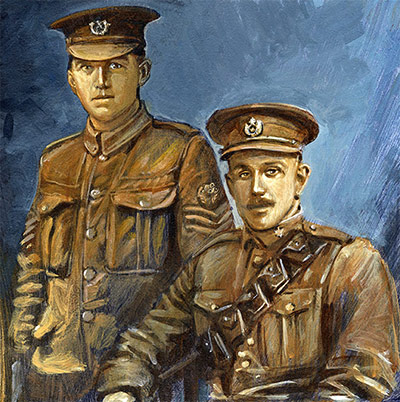John Walker: Scottish Footballer
John Walker was born on Aug 24th, 1873 in Shotts, Lanarkshire, Scotland. Although much of John's early life is unknown, it can be assumed he spent many hours playing football, since it wasn't long before he was recognized as a superior athlete in the game.
In his early twenties he rose to fame as a professional football player and during his career, he played for the following teams: Heart of Midlothian 1893-1897, Liverpool 1898-1902, Rangers 1902-04, and Greenock Morton 1904-05.
Football Career
During the 1894-95 season, Hearts won their first eleven games which stands as a club record. The Championship title was secured on February 16th, 1895 in the fourth last game when Celtic "were destroyed at Tynecastle by the razor sharp, John Walker, who scored twice in a 4-0 win". Hearts were League Champions again in 1896-97 with midfielder John Walker as team captain.
In addition to the Scottish League Championship medals won in 1895 and 1897, John Walker won a Scottish Cup medal with Hearts in 1896. The following year the team fell on hard times with injuries to key players. This led to strained finances and John Walker was sold to Liverpool for £350 (about £40,000 today).
During the 1900-01 final game, John Walker's goal in the first half against West Bromwich secured the Football League championship for Liverpool. In total he played 121 games for Liverpool and scored 30 goals. In addition he played 12 games in the F.A. Cup and scored once.
In 1902-03, he returned to Scotland and helped Rangers to win the Scottish Cup against his old club, Hearts. With the Rangers, he was also a Scottish Cup winner in 1903 and finalist in 1904. He only played a few games for Morton before a knee injury ended his career in 1905.
Military Service of John Walker
In 1910, John Walker emigrated to Canada with several members of his family and settled in Winnipeg, Manitoba, where he began work as an engineer with Manitoba Telephones.
After hostilities were declared, John was eager to join the war effort and tried to sign up with his brother Thomas, but his earlier knee injury prevented this. The injury had resulted in a wasted calf muscle which made it impossible to enlist. However, he was so determined to get into the army that (according to family lore) he taped putty to his leg to make them look the same and tried again to enlist the following year.
It is unlikely this would have been overlooked, but his attestation papers make no mention of his condition. John was eventually recruited in March 1916, and given his experience with Manitoba Telephones, he was assigned to the Signal Corps of the Canadian Engineers.
He arrived in England in May 1916 and served two years with the 5th Canadian Divisional Signal Company at Witley. In February 1918 he was transferred to the Signals division in Seaford, Sussex.
In September 1918, he was sent to France and transferred to the 1st Tramways Company. They were involved in the effort to build and repair narrow-gauge railway lines and bridges necessary to resupply the rapidly advancing troops on the front lines, especially during the Last Hundred days of the war.
Interestingly, the 1st Tramways Company was assigned to rebuild railway lines through the very area where his brother Thomas and his Machine Gun Battalion had past through literally days before. They effectively followed on the heels of the Canadian Corps from the Arras, Canal-du-Nord, Cambrai area in early October, and north-east towards Mons by November 1918.
Return to Canada
John remained in France until January 1919 when he was sent back to England. In April of that same year he sailed back to Canada and returned to Winnipeg where he resumed his work with Manitoba Telephones as an engineer. In 1925 he moved to Pilot Mound, Manitoba where he took up farming with his brother Thomas and his two sisters Mary and Elizabeth.
He became an avid curler and was known to have skipped the 'Scots' rink in many a memorable 'Spiel'. He died in 1937 as a result of a wood-cutting accident, when a pully-belt slipped off and struck him.
In his obituary, it was stated:
"John Walker grew to a sturdy manhood through exemplary conduct that preserved intact, his powerful physique, and made him outstanding in the world of sport. He quickly rose to fame as a professional football player, and in the early years of this century his name was a household word in Great Britain; his prowess earned for him International recognition - than for which there is no higher honour in football."
"He was noted as one of the most gentlemanly of players, and off the field, he was modest and retiring to a degree. All who knew him were struck by the solid strength of character and esteemed highly his fine personality. He was the type of citizen that can ill be spared in any community."
"And to many here, it was never known that he once was so illustrious a figure in the Old Country, 'Big League' sport."







